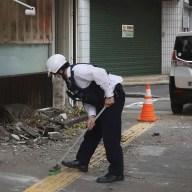SEOUL, South Korea – North Korea’s seizure of a South Korean fishing boat and its four crew members raised fears that the communist nation could use the incident to exert pressure on Seoul amid badly strained ties between the rival countries.
The Thursday apprehension follows the North’s sentencing of two American journalists to 12 years of hard labour last month and its monthslong detention of a South Korean citizen. Some analysts warn the fishermen could face a similar fate if Pyongyang is tempted to use the case as leverage to pressure Seoul.
“In similar cases in the past, the North returned fishermen after four to five days of investigation,” said Yang Moo-jin, a professor at Seoul’s University of North Korean Studies. “But considering the current tension between the two sides, it is possible for the North to hold them much longer, citing its investigation.”
South Korea said the 29-ton fishing boat “800 Yeonan” was towed away by a North Korean patrol boat Thursday morning after it crossed into the North’s eastern waters, apparently because its satellite navigation system malfunctioned.
Seoul urged the North to free the boat and crew, citing Seoul’s repatriation of North Korean fishing boats that drifted into its waters in recent years.
The North said it was investigating the incident and would keep Seoul informed of developments. It did not give further details, including the conditions of the fishermen, and Pyongyang’s state news agency carried no reports on it.
Tensions on the divided Korean peninsula reached a fever pitch last month after the South played an active role in getting the U.N. Security Council to punish Pyongyang with tough sanctions following its nuclear and missile tests.
Relations between the two have suffered dramatically since a pro-U.S., conservative government took office in Seoul last year, advocating a tougher policy on the North. Pyongyang cut off most ties in retaliation and halted all major joint projects except an industrial complex located just across the border in the North.
Pyongyang has been holding a South Korean worker at the complex since March for allegedly denouncing its political system. Seoul has repeatedly demanded his release, but so far the North has not allowed any access to him.
The North also arrested two U.S. journalists on March 17 near the North’s border with China, and sentenced them to 12 years of hard labour last month for entering the country illegally and for “hostile acts.” Laura Ling and Euna Lee work for former U.S. Vice-President Al Gore’s California-based Current TV media group.
Kim Yong-hyun, a North Korean expert at Seoul’s Dongguk University, said Pyongyang may choose to hold the boat’s crew for a while, but the case is too minor to be used for political purposes.
“It’s a simple crossing of the border. I think it’s different from the two other cases,” Kim said. “But it is still possible that the North could hold the fishermen longer than usual.”
North and South Korea are technically still at war because the 1950-53 Korean War ended with a cease-fire, not a peace treaty. Both keep a close watch on their land and sea borders.
Maritime incidents between the two sides involving fishing boats and other commercial vessels occur from time to time and are generally resolved amicably. However, the countries’ disputed western maritime border has been the scene of deadly fighting in the past.
In June 2002, six South Korean troops died when the North sank a South Korean patrol boat in the area. In June 1999, about 30 North Korean sailors were believed to have died when their boat sank in a clash with South Korea, the first naval conflict between the two sides since the Korean War.
–
Associated Press writer Kwang-tae Kim and photographer Jin-man Lee contributed to this report.
















